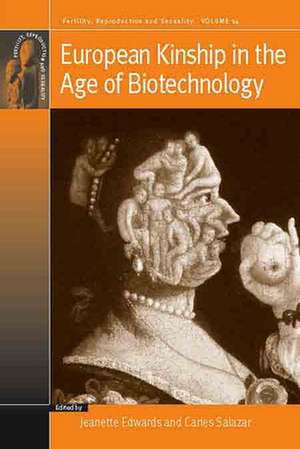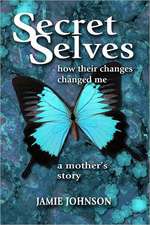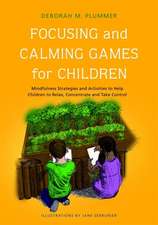European Kinship in the Age of Biotechnology: Fertility, Reproduction and Sexuality, cartea 14
Editat de Jeanette Edwards, Carles Salazaren Limba Engleză Paperback – 31 mai 2012
Jeanette Edwards is Professor of Social Anthropology at Manchester University. She has published widely on the implications of new reproductive technologies for kinship both ethnographically and theoretically. She directed the European-funded project 'Public Understanding of Genetics: a Cross-Cultural and Ethnographic Study of the "new genetics" and social identity'.
Carles Salazar is Lecturer in Social Anthropology at the University of Lleida. He received his Ph.D. from the University of Cambridge, has carried out ethnographic fieldwork in Ireland and Catalonia (Spain) and published work on kinship, sexuality, reproduction and Irish ethnography.
| Toate formatele și edițiile | Preț | Express |
|---|---|---|
| Paperback (1) | 258.50 lei 6-8 săpt. | |
| BERGHAHN BOOKS INC – 31 mai 2012 | 258.50 lei 6-8 săpt. | |
| Hardback (1) | 748.44 lei 6-8 săpt. | |
| BERGHAHN BOOKS INC – 28 feb 2009 | 748.44 lei 6-8 săpt. |
Din seria Fertility, Reproduction and Sexuality
-
 Preț: 182.43 lei
Preț: 182.43 lei -
 Preț: 260.02 lei
Preț: 260.02 lei - 23%
 Preț: 809.82 lei
Preț: 809.82 lei - 5%
 Preț: 923.19 lei
Preț: 923.19 lei - 23%
 Preț: 751.25 lei
Preț: 751.25 lei -
 Preț: 259.64 lei
Preț: 259.64 lei - 23%
 Preț: 836.65 lei
Preț: 836.65 lei -
 Preț: 302.74 lei
Preț: 302.74 lei -
 Preț: 261.56 lei
Preț: 261.56 lei - 23%
 Preț: 751.41 lei
Preț: 751.41 lei -
 Preț: 262.14 lei
Preț: 262.14 lei - 23%
 Preț: 750.49 lei
Preț: 750.49 lei -
 Preț: 260.96 lei
Preț: 260.96 lei - 23%
 Preț: 751.54 lei
Preț: 751.54 lei - 23%
 Preț: 750.66 lei
Preț: 750.66 lei - 23%
 Preț: 749.02 lei
Preț: 749.02 lei -
 Preț: 265.20 lei
Preț: 265.20 lei - 23%
 Preț: 750.49 lei
Preț: 750.49 lei -
 Preț: 256.92 lei
Preț: 256.92 lei -
 Preț: 260.19 lei
Preț: 260.19 lei - 5%
 Preț: 926.14 lei
Preț: 926.14 lei - 23%
 Preț: 752.00 lei
Preț: 752.00 lei - 5%
 Preț: 1030.42 lei
Preț: 1030.42 lei - 5%
 Preț: 926.87 lei
Preț: 926.87 lei - 23%
 Preț: 749.02 lei
Preț: 749.02 lei -
 Preț: 218.99 lei
Preț: 218.99 lei
Preț: 258.50 lei
Nou
Puncte Express: 388
Preț estimativ în valută:
49.46€ • 51.78$ • 40.93£
49.46€ • 51.78$ • 40.93£
Carte tipărită la comandă
Livrare economică 07-21 aprilie
Preluare comenzi: 021 569.72.76
Specificații
ISBN-13: 9780857453655
ISBN-10: 0857453653
Pagini: 232
Dimensiuni: 152 x 229 x 12 mm
Greutate: 0.32 kg
Editura: BERGHAHN BOOKS INC
Seria Fertility, Reproduction and Sexuality
ISBN-10: 0857453653
Pagini: 232
Dimensiuni: 152 x 229 x 12 mm
Greutate: 0.32 kg
Editura: BERGHAHN BOOKS INC
Seria Fertility, Reproduction and Sexuality
Notă biografică
Jeanette Edwards is Professor of Social Anthropology at Manchester University. She has published widely on the implications of new reproductive technologies for kinship both ethnographically and theoretically. She is author of Born and Bred: Idioms of Kinship and New Reproductive Technologies in England (Oxford University Press, 2000) and co-author of Technologies of Procreation: Kinship in the Age of Assisted Conception (Routledge 2nd ed., 1999). She directed the European-funded project 'Public Understanding of Genetics: a Cross- Cultural and Ethnographic Study of the "new genetics" and social identity'. Carles Salazar is Lecturer in Social Anthropology at the University of Lleida. He received his PhD from the University of Cambridge and has carried out ethnographic fieldwork in Ireland and Catalonia (Spain). His publications include A Sentimental Economy (1996, Berghahn) and Anthropology and Sexual Morality (2006, Berghahn) and a number of articles on kinship, sexuality, reproduction and Irish ethnography.
Cuprins
Acknowledgements Introduction: The Matter in Kinship Jeanette Edwards Chapter 1. Knowing and Relating: Kinship, Assisted Reproductive Technologies and the New Genetics Joan Bestard Chapter 2. Imagining Assisted Reproductive Technologies: Family, Kinship and 'Local Thinking' in Lithuania Auksuole Cepaitiene Chapter 3. Eating Genes and Raising People: Kinship Thinking and Genetically Modified Food in the North of England Cathrine Degnen Chapter 4. The Family Body: Persons, Bodies and Resemblance Diana Marre and Joan Bestard Chapter 5. The Contribution of Homoparental Families to the Current Debate on Kinship Anne Cadoret Chapter 6. Corpo-real Identities: Perspectives from a Gypsy Community Nathalie Manrique Chapter 7. Incest, Embodiment, Genes and Kinship Enric Porqueres i Gene and Jerome Wilgaux (France) Chapter 8. 'Loving Mothers' at Work: Raising Others' Children and Building Families with the Intention to Love and Take Care Eniko Demeny Chapter 9. Adoption and Assisted Conception: One Universe of Unnatural Procreation. An Examination of Norwegian Legislation Marit Melhuus and Signe Howell Chapter 10. Fields of Post-human Kinship Ben Campbell Chapter 11. Are Genes Good to Think With? Carles Salazar Notes on Contributors Bibliography Author Index Subject Index
Recenzii
"This superb anthology extends the emphasis on technology that has become such a prominent feature of much recent anthropological work on kinship - In this richly ethnographic text, the most familiar problems produce the most unusual answers - Each chapter brilliantly combines kinship as a matrix with kinship as a tool, using ethnographic examples that leap off the page." * Journal of Anthropological Research













